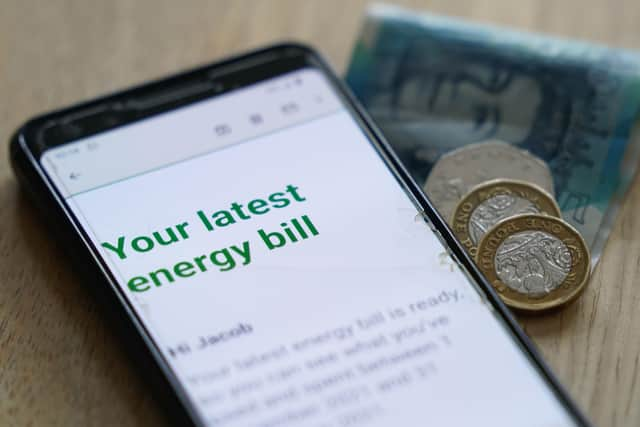DUP MP Sammy Wilson says new PM can cut VAT, income tax, and target extra support to people on benefits to tackle soaring prices
and live on Freeview channel 276
East Antrim MP Sammy Wilson set out a range of possible measures for Boris Johnson’s replacement — due to be named today — amid increasing concerns about how people will cope as the price of oil, gas, and electricity continues to rise.
Yesterday, the favourite to win the Conservative leadership race Liz Truss said in an interview with the BBC that she would announce a plan to deal with soaring energy costs within a week if she becomes prime minister.
Advertisement
Hide AdAdvertisement
Hide AdThe frontrunner promised to “act immediately” to help with bills but offered no details, telling the broadcaster she would need time in office first in order to finalise exact proposals.


She, or rival Rishi Sunak, will be announced as the next Prime Minister today but won’t take office until tomorrow.
Speaking to the News Letter, the DUP’s Sammy Wilson set out a number of options available to the new Prime Minister.
“In the short run, people are going to be getting high energy bills over the winter and they’re going to need some help,” he said.
Advertisement
Hide AdAdvertisement
Hide Ad“There is £400 that people are going to be getting off their electricity bill which is obviously a good start. But she is going to have to introduce some measures to give people support.”


He continued: “That’s why I think, for example, that taking VAT off the bills is a good idea and taking the enormous green taxes off the bills - which would save probably around £200 off the bills as well.
“Those are kind of short term measures which I think she can take to help people through the winter.
“It will not compensate totally for the increase in energy costs but it will go a long way towards it.
Advertisement
Hide AdAdvertisement
Hide Ad“Those two things combined, along with the £400, would go a long way.”
He suggested further support would be needed, saying: “That would target it to people’s energy bills, but I think they still need to find ways of targeting people who are really going to be in hardship, rather than just a general reduction in costs for people. I think they are going to do that.
“I think one of the things they can is help people who are on benefits.
“They are easily identified, without the need for an expensive process, because you are either on benefits or you are not on benefits.”
Advertisement
Hide AdAdvertisement
Hide AdMr Wilson added: “The more difficult people to reach are those who are in work, not on benefits, but not earning a great deal of money. She could do one of two things there - she could raise either the threshold when people start paying tax, or reduce the standard rate of income tax.
“One of the things that has been suggested by the Centre for Brexit Policy, which I’m a member of, was to reduce the standard rate of income tax from 20% to 15% — and that would help an awful lot of people who are on low incomes.”
He added: “Those are the kinds of things I think need to be done in the immediate time. She [Liz Truss] has said that when she wins she’s going to make an announcement within days, and those are the kinds of things I would like to see announced.”
In Northern Ireland, a series of sharp increases in energy costs have been recorded in recent weeks.
Advertisement
Hide AdAdvertisement
Hide AdThe average cost of filling a 900 litre tank of home heating oil jumped by nearly £200 in the space of a fortnight, according to the latest update from the Northern Ireland Consumer Council on Thursday.
When the figures were published on September 1, the average cost of 900 litres of kerosene was £928.98 — a rise of £188.11 on the average cost two weeks previous.
Electricity bills are also continuing to increase.
One of the largest providers, SSE Airtricity, announced last month that gas prices will rise by 28.3% from October 1 and electricity prices will go up by 35.4% from the same date.
Electric Ireland, a firm which supplies around 100,000 households in Northern Ireland, also announced last week that its prices are to go up by 29% from the beginning of next month.
The rises were the latest in a series of price hikes already announced this year.